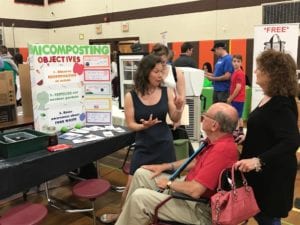Who is a member?
Our members are the local governments of Massachusetts and their elected and appointed leadership.

Residents learn about residential composting during the Cooler Community Expo on May 23 at Agawam High School. (Photo courtesy of Agawam Energy Commission)
Agawam held a Cooler Community Expo on May 23 as the culmination of its Cooler Community Challenge, a monthslong outreach program centered around energy conservation.
The program, spearheaded by the Agawam Energy Commission in partnership with Ener-G-Save, a regional environmental advocacy organization, worked to engage students in thoughtful energy use by incorporating efficiency-based activities into their science classes.
“We [had] participation from every grade level,” said Marc Strange, Agawam’s director of planning and community development and a member of the Energy Commission. “Some grades [did] projects on solar energy, some on recycling, and some on water conservation.”
The projects ranged from a high school greenhouse initiative to a Lego trash-sorting machine. Most were incorporated into existing STEM and STEAM curricula, drawing on math and science to reinforce the importance of energy efficiency. Organizers said the program was also intended to build students’ problem-solving skills.
The Cooler Community Challenge’s presence in schools reflects the Energy Commission’s mission to invest in the future of the community.
“By doing the community challenge and involving the schools … our kids are becoming more aware of energy conservation and smart energy use,” said Energy Commission Chair Mark Morris. “We [did] something interesting in Agawam, and for our community. It has a payout that could last well into the future.”
Through the outreach in schools, the Energy Commission hoped to engage 500 to 1,000 households in conversations about energy efficiency. While the impact is still being assessed, Strange said Agawam “anticipates a lot of participation from the parents and relatives of the school-age children.”
The parents’ participation in the Cooler Challenge centered around an energy reduction pledge, the results of which are still being tallied. If 20 percent of Agawam school district parents participate, Agawam’s schools will each receive a $500 grant from the Harold Grinspoon Charitable Foundation, the parent foundation of Ener-G-Save.
The pledge offers a number of energy reduction options that vary in expense and scale, from installing solar panels to using the cold setting more often when washing clothes.
“It allows everybody to find something that they can do that will benefit them and benefit our community,” Morris said.
Agawam expects the Cooler Challenge to be a win-win for residents and town leadership.
“The benefits [of the program] are having a community to live in that’s not using as much energy, which can be very good from an air quality, water quality and a lot of standpoints,” Morris said, adding that reduced energy use “[saves] dollars and cents, reducing costs at home.”
In addition to student energy-saving projects, the Cooler Community Expo featured an environmental rapper, local food trucks and kids’ activities. For adults, the expo included talks from renewable energy vendors about the environment and their products, and local car dealerships showing hybrid and electric cars.
“I think it’s so powerful that each of these parts came together,” said Leslie Joseph, a member of the Energy Commission. “Ener-G-Save, the town, and the schools all did their part to make this expo happen.”
Ener-G-Save, which focuses on helping western Massachusetts homeowners reduce energy consumption, hopes to use the Agawan Cooler Community Challenge as a template for future outreach projects. Joseph urged other towns thinking about taking up a similar challenge to focus on the ability of the schools and town government to come together to craft a unique event.
Written by Elisa Sturkie, Communications Intern